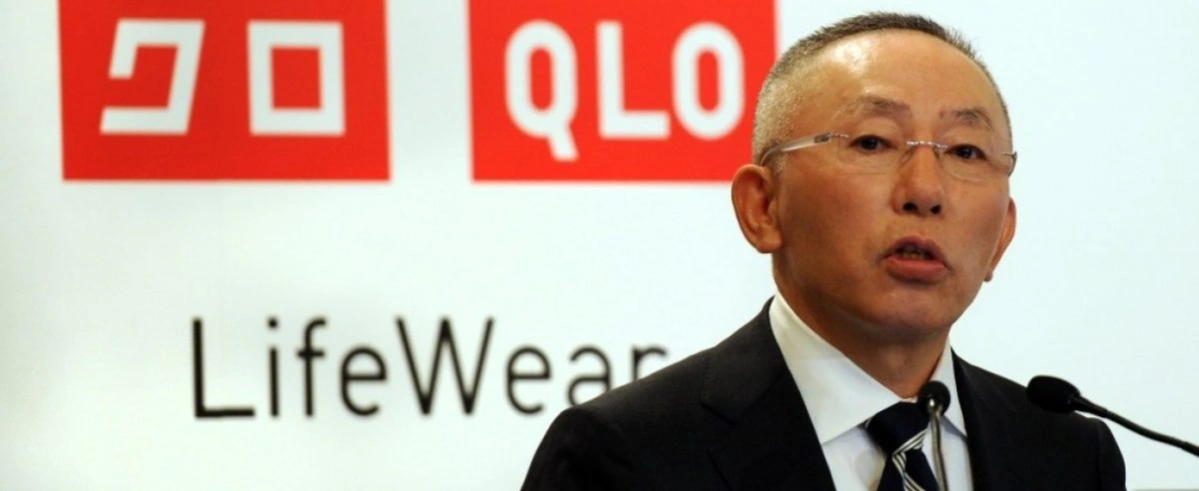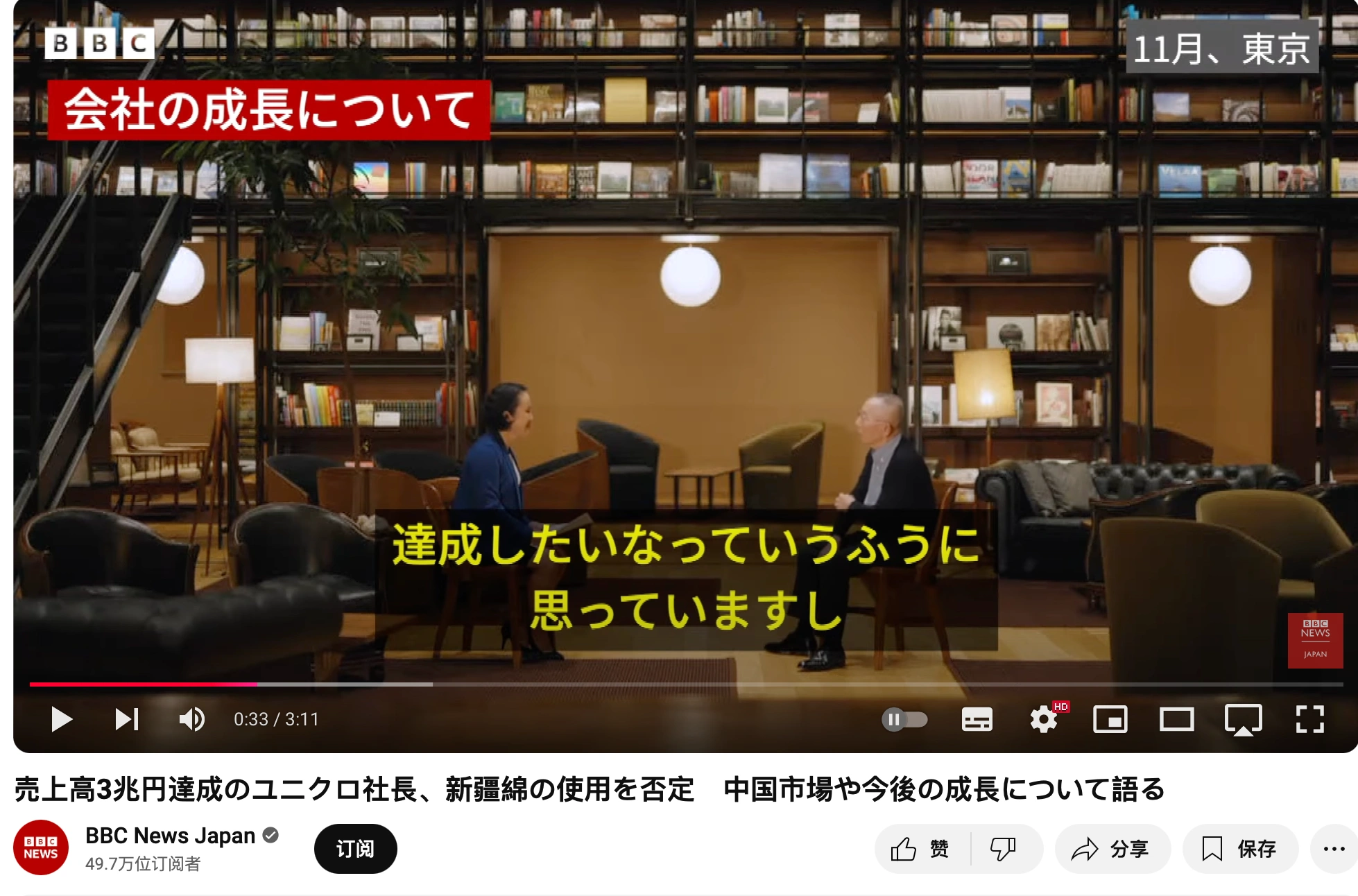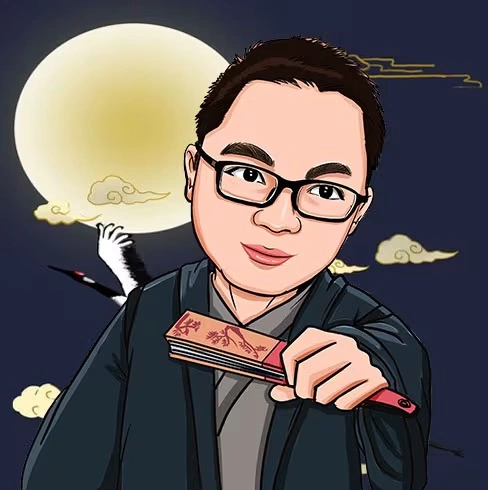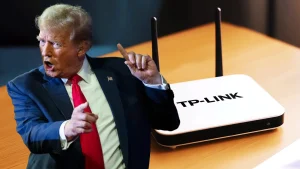Xinjiang Cotton Targeted Again—Chinese Tired of BBC Hype

The beginning of the report offers commentary on the interview content: “China is a crucial market for Uniqlo not just for customers but also as a major manufacturing hub.” The article then proceeds to make unfounded accusations and attacks on Xinjiang cotton, stating, “Xinjiang cotton was once known as some of the best fabric in the world.” The phrase “once known as” implies that Xinjiang cotton is no longer considered the finest in the world. However, the reality is that Xinjiang cotton has consistently been famous for its high quality, making this wording a biased negation.
 The BBC Japanese channel released an interview video with the founder of Uniqlo.
The BBC Japanese channel released an interview video with the founder of Uniqlo.
Based on the report, we can summarize three key facts:
In the interview, when asked about the use of Xinjiang cotton, Yanai responded, “We’re not using (cotton from Xinjiang).” This statement reflects the current status of their supply chain, rather than a commitment about the future. It’s important to note that he said “not using” instead of “won’t use.”
As early as 2021, Yanai clarified that Uniqlo would maintain a neutral stance regarding the Xinjiang cotton issue. At the time, Western public opinion had started to criticize Xinjiang cotton over allegations of “forced labor,” leading to several well-known brands like H&M, Nike, Burberry, and Adidas publicly declaring they would stop using Xinjiang cotton, which resulted in a strong backlash in the Chinese market. When faced with similar questions, Yanai told Nikkei Asia in 2021, “We want to be neutral between the U.S. and China,” adding that “The U.S. approach is to force companies to show their allegiance,” and that he “won’t play that game.”
During the BBC interview, Yanai remarked, “There are 1.4 billion people in China and we only have 900 to 1,000 stores,” and he believes Uniqlo can “increase that to 3,000 stores.” This indicates a substantial reliance on the Chinese market. While production costs in China have risen, replicating the success of the Chinese market in other Southeast Asian countries is challenging. As Yanai mentioned, in 2009, 80% of Uniqlo’s products were made in China. However, as labor costs in China have increased, Uniqlo has shifted some production to lower-wage countries like Cambodia to keep prices down. This reflects the current realities of production costs and labor in China compared to other Southeast Asian countries.
What Did Tadashi Yanai Actually Say in Japanese?
Based on the facts mentioned earlier, we can delve deeper into the content of the interview. The interview lasted about nine and a half minutes, with less than 30 seconds devoted to the topic of Xinjiang cotton. After discussing corporate management and goals like “expanding beyond Asia,” the host suddenly shifted the topic to Xinjiang cotton.
It’s important to note that the BBC journalist was fluent in both Japanese and English. In the English version of the interview, the journalist asked questions in English, while Yanai responded in Japanese. In the Japanese version, both the questions and answers were in Japanese, and clearly, the English version had been edited.
There are two key points worth considering in this interview:
When analyzing Yanai’s wording in Japanese, precision matters. We need to distinguish whether he meant “subjectively does not want to use” or “objectively has not used.” If it was the former, the phrase would likely be “使わない” (won’t use). However, Yanai used the expression “それは使っていませんし” (we’re not using), which objectively conveys that they have not used Xinjiang cotton up until now. This is a factual statement, and people can form their own interpretations.
A comparison of the BBC’s Japanese and English versions reveals significant differences in editing and guiding the narrative, especially regarding the phrasing of questions, the sequence of topics, and the video titles.
In the English version, after Yanai mentions “increase that to 3,000 stores,” the video cuts to a close-up of the journalist asking, “I want to ask you about supply chains because… Can you clarify any cotton from Xinjiang in Uniqlo products?”
In the English-dubbed version, Yanai’s response was: “We’re not using cotton from Xinjiang, you know by mentioning which cotton we’re using. Actually, it gets too political if I say anymore, so let’s stop here.” In contrast, the Japanese version does not include the phrase “you know by mentioning which cotton we’re using.”
The English version also introduces many terms not found in the Japanese version. For example, the English version used the word “controversy,” while the Japanese simply referred to “the emergence of this issue/topic.” The English version further discussed “customer trust in Uniqlo’s supply chain and human rights/environment,” while the Japanese version only mentioned “environment and human rights,” leaving out the elements of “customers” and “trust.” Therefore, the English version conveys a broader and more politically charged meaning.
Additionally, the order of the questions was also adjusted. The Japanese version, running about nine minutes, abruptly shifted from discussing inheritance and personnel management at the six-minute mark to the supply chain issue. The BBC edited a three-minute video in English, cutting straight to the supply chain question after Yanai’s comments about expanding the Chinese market to 3,000 stores.
Finally, the titles of the two versions of the video differ. The Japanese version focused on Uniqlo’s president’s goals and vision, making it appear as a more general corporate profile. On the other hand, the English version mirrored the headline of the written report: “Uniqlo does not use Xinjiang cotton, boss says.” This reflects a much more politically charged framing.
Is Tadashi Yanai Really Politically Neutral?
Based on the facts and analysis presented above, we can categorize the various reactions to the issue into three positions: one that calls for a boycott of Uniqlo, another that blames the BBC for distorting the facts, and a neutral stance that focuses on how companies can remain politically neutral.
The group opposing Uniqlo can be further divided into three viewpoints:
While Yanai’s statement “we’re not using (Xinjiang cotton)” is objectively accurate, some critics argue that his subjective stance remains questionable. Those who oppose Uniqlo believe that while Yanai’s response may sound like a neutral fact, it overlooks the context. Given Uniqlo’s massive and ongoing reliance on the Chinese market, the mere act of not using Xinjiang cotton—without appeasing China—is a political statement in itself. This group sees Yanai’s answer as implicitly oppositional, especially when viewed through the lens of Uniqlo’s dependence on China.
Some critics wonder if Yanai lacks basic political awareness. In the interview, after discussing Uniqlo’s operations, the journalist suddenly shifted from a topic on Xinjiang cotton to a personal question about how Yanai relaxes, which seemed entirely disconnected from the previous question. The fact that the interview’s primary focus—less than 30 seconds of Xinjiang cotton discussion—was the core of the BBC’s story, indicates that the interview’s framing was already established from the start: Xinjiang cotton. Did Yanai really think the BBC came to promote Uniqlo as a company, or was it using Uniqlo to criticize and attack China? Yanai himself admitted, “If I say more, it gets too political,” which raises the question: if he truly wanted to maintain political neutrality, he should have declined to answer the question, perhaps saying something like, “I don’t want to discuss this issue,” or reiterating his stance from previous statements that the company remains neutral. His answer, “We’re not using (Xinjiang cotton),” is thus seen by this group as a political expression rather than a neutral statement.
Another viewpoint argues that compared to 2021, the international political environment has dramatically shifted by 2024. In 2021, the Biden administration may not have applied as much pressure, but with Trump now winning the election, Uniqlo could feel compelled to take a position. This group suggests that Yanai’s ambition for Uniqlo to be “not just popular in Asia, but globally” means the company might need to align itself with “Western mainstream media narratives.” Thus, Yanai’s participation in the BBC interview could be seen as an attempt to demonstrate loyalty to “Western society,” leading some to question whether his stance of “political neutrality” in 2021 can still be defended in 2024.
On the other hand, another group believes “this whole issue has nothing to do with Uniqlo,” and that Uniqlo is merely a victim. This group asserts, “It is the BBC at fault.” They argue that after Trump’s rise to power, the U.S. government made “anti-China” sentiment a consensus across party lines, and Western media like the BBC have to demonstrate their “anti-China values.” Therefore, the BBC, in order to prove its “anti-China” credentials, deliberately stirs up the Xinjiang cotton issue again. According to this view, the BBC is eager to show its position as a leading “anti-China media” outlet and to disrupt the current warming of relations between China and Japan, using Uniqlo as a pawn to hype the Xinjiang cotton controversy. The so-called corporate discussions were merely a setup, and Yanai fell into the BBC’s trap by engaging with the topic.
The neutral group, meanwhile, focuses mainly on corporate operations, discussing how big companies can maintain political neutrality. When a company becomes large, every action it takes, or fails to take, will be scrutinized and discussed.
Conclusion
From this incident, we can see both the subjectivity in media information dissemination and the difficulties faced by companies under political pressure. The core of the analysis lies in understanding exactly what Yanai “said” and what the BBC’s motivations are. In a globalized context, companies often struggle to completely distance themselves from political issues, but maintaining neutrality is likely to remain a long-term challenge for multinational corporations like Uniqlo.
Ultimately, whether it’s corporations, media, or consumers, the best approach in such controversies is to pursue truth and avoid being manipulated by emotions or misinformation. This is the optimal solution when discussing such complex issues.




Anonymous
Instead of letting the Chinese people interpret or assume his political affiliations and motives, Yanai should quickly issue a statement to clear the air and let everyone know where his company stands with regard to the use of Xinjiang cotton. The fact that he has kept silent seems to indicate that not using Xinjiang cotton is the company’s policy. In that case Uniqlo deserves to be boycotted. No foreign company should continue to make huge profits in China while joining the West to undermine the stability of a critical province of China.